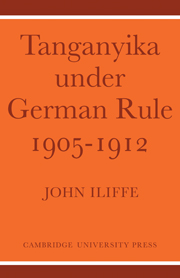Book contents
- Frontmatter
- Contents
- Preface
- Terminology
- Abbreviations
- Glossary
- Map of Tanganyika in 1912
- 1 The argument
- 2 The Maji Maji rebellion
- 3 The political context
- 4 Rechenberg and reconstruction
- 5 The European challenge
- 6 White man's country
- 7 The collapse of the local compromise
- 8 The age of improvement
- 9 The new dilemma
- Bibliography
- Index
3 - The political context
Published online by Cambridge University Press: 04 August 2010
- Frontmatter
- Contents
- Preface
- Terminology
- Abbreviations
- Glossary
- Map of Tanganyika in 1912
- 1 The argument
- 2 The Maji Maji rebellion
- 3 The political context
- 4 Rechenberg and reconstruction
- 5 The European challenge
- 6 White man's country
- 7 The collapse of the local compromise
- 8 The age of improvement
- 9 The new dilemma
- Bibliography
- Index
Summary
The Maji Maji rebellion compelled an increased German commitment in East Africa, but left open the question of the form which that commitment should take. The answer to this question was decided largely by Europeans, after intense controversy in Germany and East Africa. To understand the answer which they found, it is necessary to understand the political and administrative system which generated it, and especially the anomalous position of the colonies in Germany's constitutional structure.
Bismarck's constitution of 1871 attempted to combine the three major strands in constitutional theory and practice. One was the tradition of the Obrigkeitsstaat, the authoritarian state administered by a hierarchy of civil servants responsible to the monarchy. The second was the particularist tradition preserved in the many petty principalities and self-governing cities. Concepts of German unity and national identity formed a third, more recent element. In the new empire, sovereignty resided in the totality of the 25 constituent states and was expressed through the federal Bundesrat on which they were represented. This was the particularist element. Imperial executive leadership (Reichsleitung) was exercised by the king of Prussia and emperor of Germany, advised by an imperial Chancellor appointed by and responsible to him. This was the authoritarian element, and also the concession to Prussia's dominant role in the creation of the state.
- Type
- Chapter
- Information
- Tanganyika Under German Rule 1905–1912 , pp. 30 - 48Publisher: Cambridge University PressPrint publication year: 1969



